Picture this: you’ve just invested in life-changing dental implants to restore your smile and confidence. You’re excited about biting into your favorite foods again and smiling without hesitation. But then you remember—you’re a smoker, and you’re wondering how this habit might affect your journey to a better smile. The truth is, smoking after dental implants can significantly impact your healing process and long-term success, but with the right knowledge and commitment, you can still achieve the beautiful, functional smile you deserve.
Key Takeaways
- Smoking dramatically increases the risk of dental implant failure by reducing blood flow and oxygen to healing tissues
- The first 72 hours after implant surgery are critical—avoiding smoking during this period is essential for proper healing
- Quitting smoking entirely gives you the best chance for successful implant integration and long-term oral health
- Even reducing smoking can improve outcomes, though complete cessation is strongly recommended
- Professional support and smoking cessation programs can help you succeed in quitting before and after your implant procedure
Why Smoking After Dental Implants Is a Serious Concern
When you choose dental implants, you’re making an investment in your quality of life. These titanium posts need to integrate with your jawbone through a process called osseointegration—essentially, your bone grows around the implant to create a stable foundation for your new tooth.
Smoking disrupts this critical healing process in several ways:
Reduced Blood Flow and Oxygen 🚫
Nicotine constricts blood vessels, dramatically reducing the flow of oxygen-rich blood to your healing tissues. Your implant site needs abundant oxygen and nutrients to heal properly and integrate with your jawbone.
Compromised Immune System
Smoking weakens your body’s natural ability to fight infection and heal wounds. This leaves your implant site vulnerable to complications that could lead to implant failure.
Delayed Tissue Healing
The chemicals in cigarettes slow down the production of collagen, a protein essential for tissue repair. This means your gums and bone take longer to heal around your new implant.
Increased Risk of Infection
Smokers have higher levels of harmful bacteria in their mouths and reduced ability to fight off infections. This creates a perfect storm for complications around your implant site.
The Timeline: When Smoking After Dental Implants Matters Most
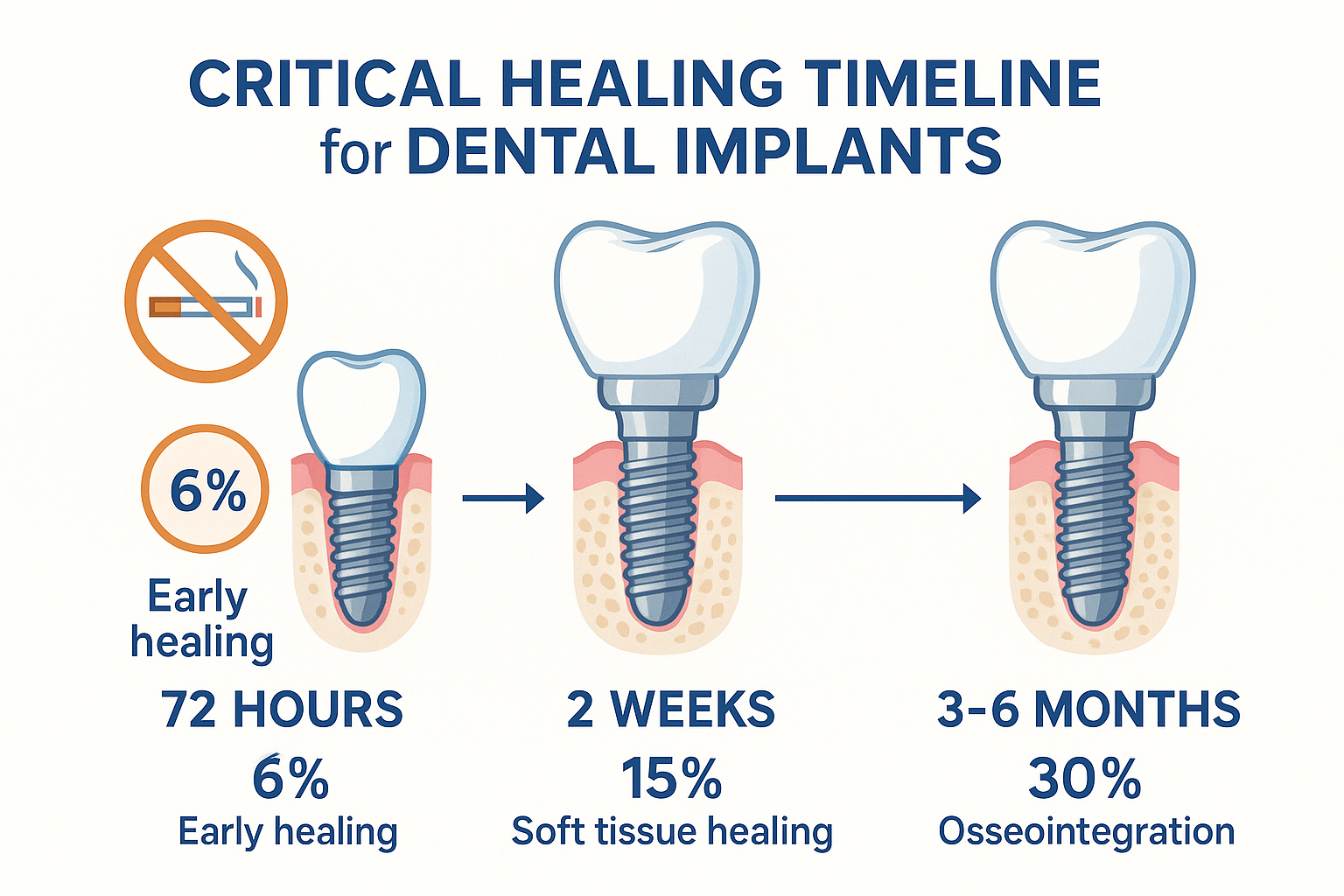
Understanding when your implants are most vulnerable can help you make informed decisions about your smoking habits.
First 72 Hours: Critical Period ⚠️
The first three days after your implant surgery are absolutely crucial. During this time:
- Blood clots are forming to protect the surgical site
- Initial healing processes are beginning
- Your risk of dry socket and infection is highest
Smoking during this period can be devastating to your healing process and significantly increase your risk of complications.
First Two Weeks: Active Healing
During the first two weeks, your gums are actively healing and beginning to attach to your implant. Smoking during this period can:
- Disrupt gum healing
- Increase swelling and discomfort
- Delay the initial integration process
First 3-6 Months: Osseointegration
This is when the magic happens—your jawbone grows around and integrates with your implant. Smoking during this critical period can prevent proper bone integration, leading to implant failure.
🦷 Dental Implant Smoking Risk Calculator
The Real Risks: What Smoking After Dental Implants Can Cost You
Let’s be honest about what’s at stake when you continue smoking after dental implants. The consequences go beyond just healing complications—they can affect your investment, your health, and your quality of life.
Implant Failure Rates 📊
Research shows that smokers have significantly higher implant failure rates:
- Non-smokers: 95-98% success rate
- Light smokers (1-10 cigarettes/day): 85-90% success rate
- Heavy smokers (20+ cigarettes/day): 70-80% success rate
Financial Impact
When implants fail due to smoking, you may face:
- Implant removal costs
- Bone grafting procedures to repair damage
- Replacement implant costs
- Extended treatment time and additional appointments
If you’re considering full mouth dental implants, the financial stakes become even higher when smoking threatens your investment.
Health Complications
Beyond implant failure, smoking after dental implants can lead to:
- Peri-implantitis (inflammation around the implant)
- Bone loss around the implant site
- Gum recession and aesthetic problems
- Chronic infections that are difficult to treat
Your Best Options: Strategies for Success
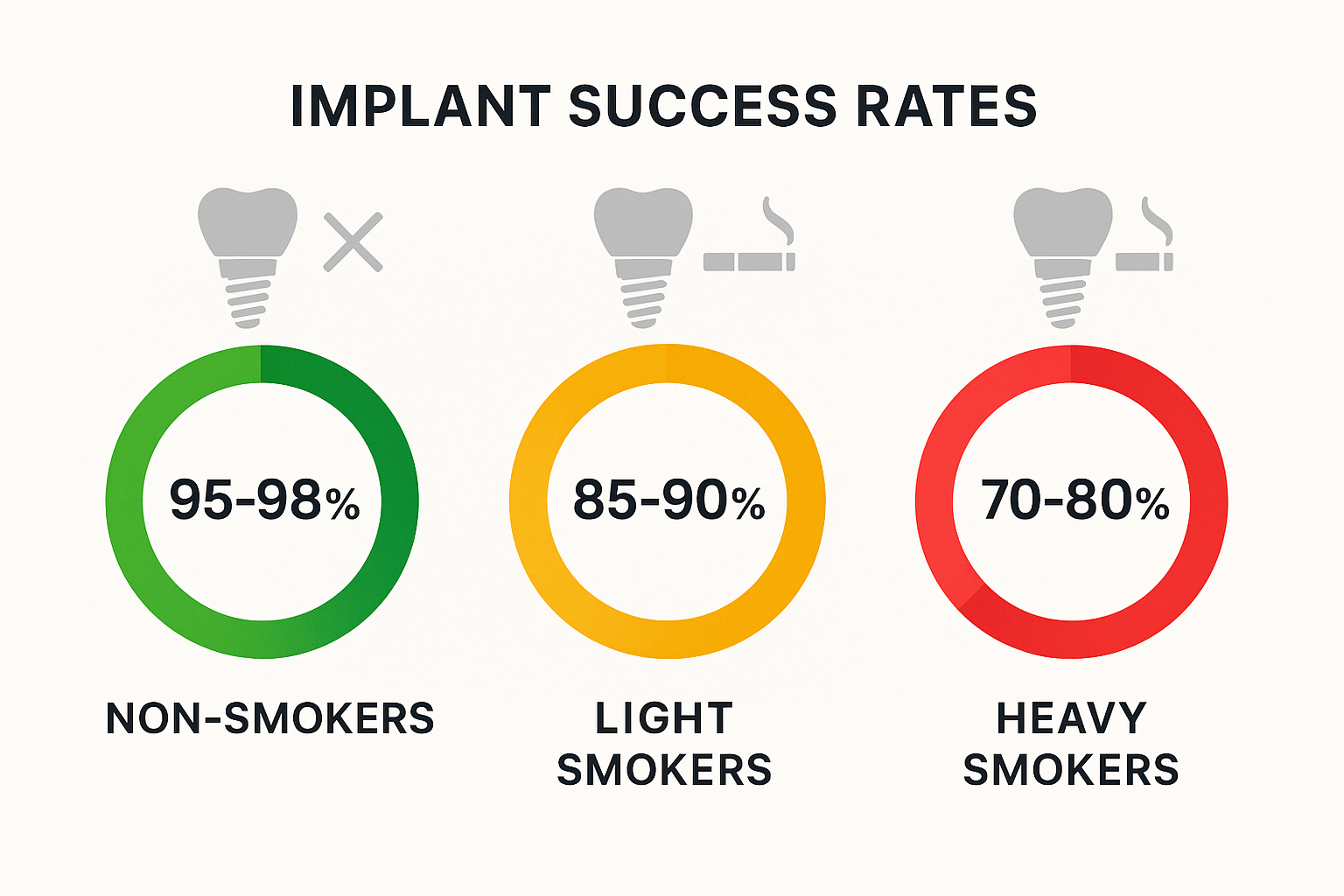
The good news? You have several strategies to maximize your implant success, even if you’re currently a smoker.
Option 1: Complete Smoking Cessation (Recommended) ⭐
Quitting smoking entirely gives you the best chance for successful implant integration and long-term oral health. Here’s your roadmap:
Before Surgery:
- Quit at least 2-4 weeks before your implant procedure
- Use nicotine replacement therapy if needed
- Consider prescription smoking cessation medications
- Join a support group or counseling program
After Surgery:
- Avoid smoking for at least 2-3 months during osseointegration
- Use this healing period to establish new, healthier habits
- Focus on the investment you’ve made in your smile
Option 2: Significant Reduction
If quitting entirely feels overwhelming, dramatic reduction can still improve your outcomes:
- Reduce to fewer than 5 cigarettes per day
- Avoid smoking for 72 hours after surgery (minimum)
- Never smoke within 2 hours of meals (when blood flow to gums increases)
- Consider switching to nicotine gum or patches temporarily
Option 3: Strategic Timing
If you can’t quit long-term, strategic timing can help:
- Stop smoking 48-72 hours before surgery
- Avoid smoking for at least 72 hours after surgery
- Minimize smoking during the first 2 weeks of healing
- Never smoke immediately before or after dental appointments
Alternative Solutions for Heavy Smokers
If you’re a heavy smoker who’s struggled to quit, don’t lose hope. There are still options to restore your smile:
All-on-4 or All-on-6 Implants
These permanent teeth in a day solutions use fewer implants strategically placed for maximum stability. While smoking still affects success rates, the reduced number of implant sites may be more manageable.
Staged Treatment Approach
Your dental team might recommend:
- Starting with a partial solution
- Allowing time for smoking cessation
- Completing treatment once you’ve successfully quit
Enhanced Monitoring Protocol
Heavy smokers may benefit from:
- More frequent follow-up appointments
- Professional cleanings every 3 months
- Additional imaging to monitor implant integration
- Prescription mouth rinses to reduce bacterial load
Supporting Your Success: Resources and Tools
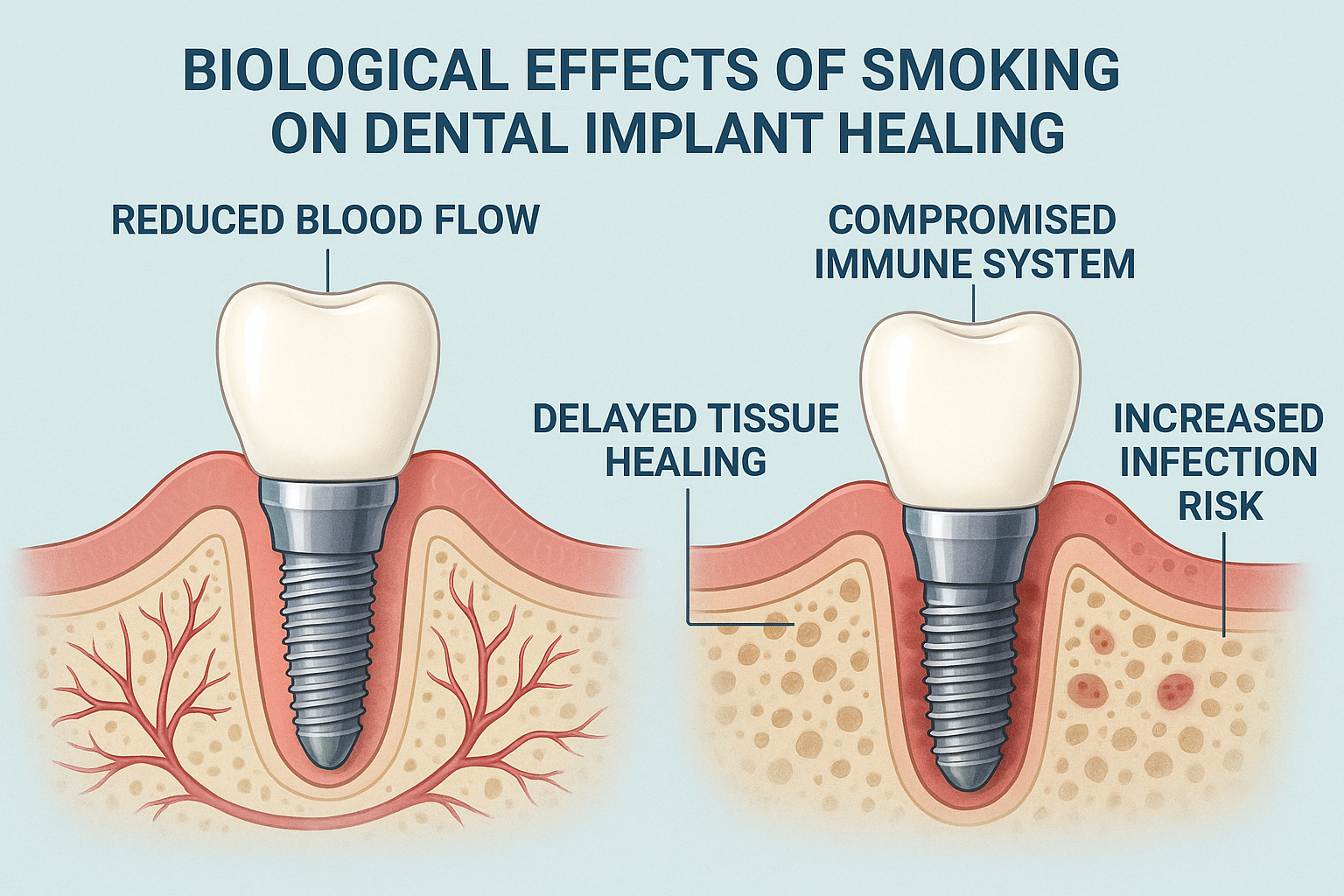
Quitting smoking is challenging, but you don’t have to do it alone. Here are resources that can help:
Medical Support
- Prescription medications like Chantix or Zyban
- Nicotine replacement therapy (patches, gum, lozenges)
- Behavioral counseling and support groups
Digital Tools
- Smoking cessation apps to track progress
- Online support communities
- Telemedicine consultations with specialists
Dallas-Area Resources
- Local smoking cessation programs
- Support groups through hospitals and community centers
- Counseling services specifically for dental patients
What to Expect: Your Healing Journey
Understanding what normal healing looks like can help you stay motivated and recognize potential problems early.
Week 1-2: Initial Healing
Normal: Mild swelling, some discomfort, soft diet
Red flags: Severe pain, excessive bleeding, signs of infection
Month 1-3: Soft Tissue Integration
Normal: Gums healing around implant, reduced sensitivity
Red flags: Persistent swelling, implant mobility, unusual discharge
Month 3-6: Osseointegration
Normal: Implant feels stable, no pain or discomfort
Red flags: Implant movement, persistent pain, bone loss on X-rays
If you’re considering the full mouth reconstruction process, this timeline becomes even more critical for your overall success.
Making the Investment Worthwhile
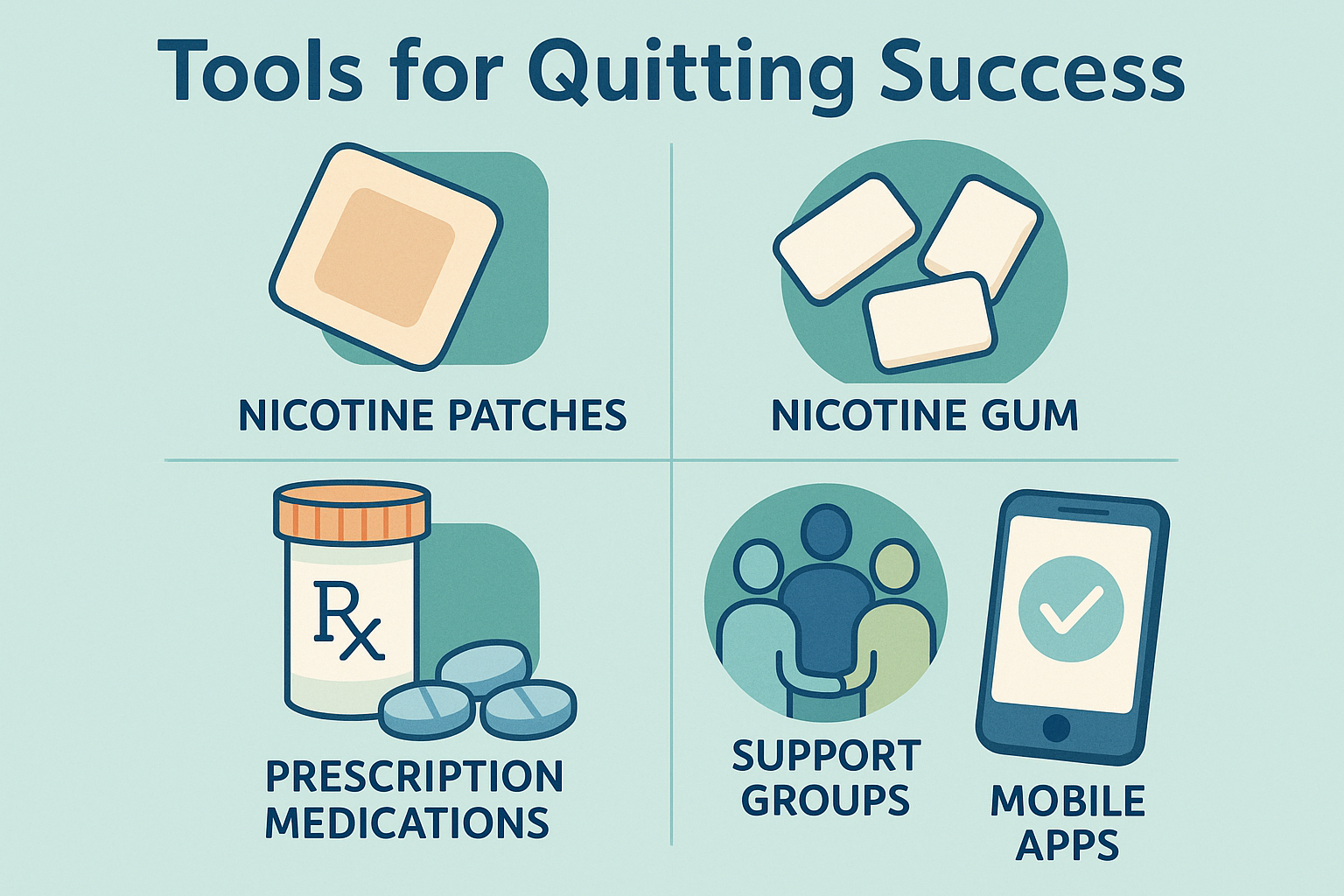
Dental implants represent a significant investment in your quality of life. When you consider the cost to replace all teeth with implants, protecting that investment becomes crucial.
Long-term Value
Successful implants can last 25+ years with proper care, making them one of the most cost-effective tooth replacement options available.
Quality of Life Benefits
- Eat your favorite foods without restriction
- Smile with confidence in social situations
- Speak clearly without worrying about dentures
- Maintain facial structure and prevent bone loss
Protecting Your Investment
- Follow all post-operative instructions carefully
- Maintain excellent oral hygiene
- Attend regular dental checkups
- Address any concerns promptly with your dental team
Special Considerations for Complex Cases
Some patients face additional challenges that make smoking cessation even more critical:
Full Mouth Reconstruction
If you’re considering full mouth implant packages, smoking poses exponentially greater risks because:
- Multiple implant sites increase the chance of complications
- Treatment costs are significantly higher
- Recovery time is extended
- The impact of failure affects your entire mouth
Bone Grafting Procedures
Patients who need bone grafts before implants face additional risks from smoking:
- Grafted bone takes longer to integrate
- Blood supply to grafted areas is already compromised
- Smoking further reduces healing capacity
- Graft failure may require starting over completely
Medical Complications
Patients with diabetes, heart disease, or other health conditions need to be especially cautious about smoking after dental implants, as these conditions already compromise healing.
Working with Your Dental Team
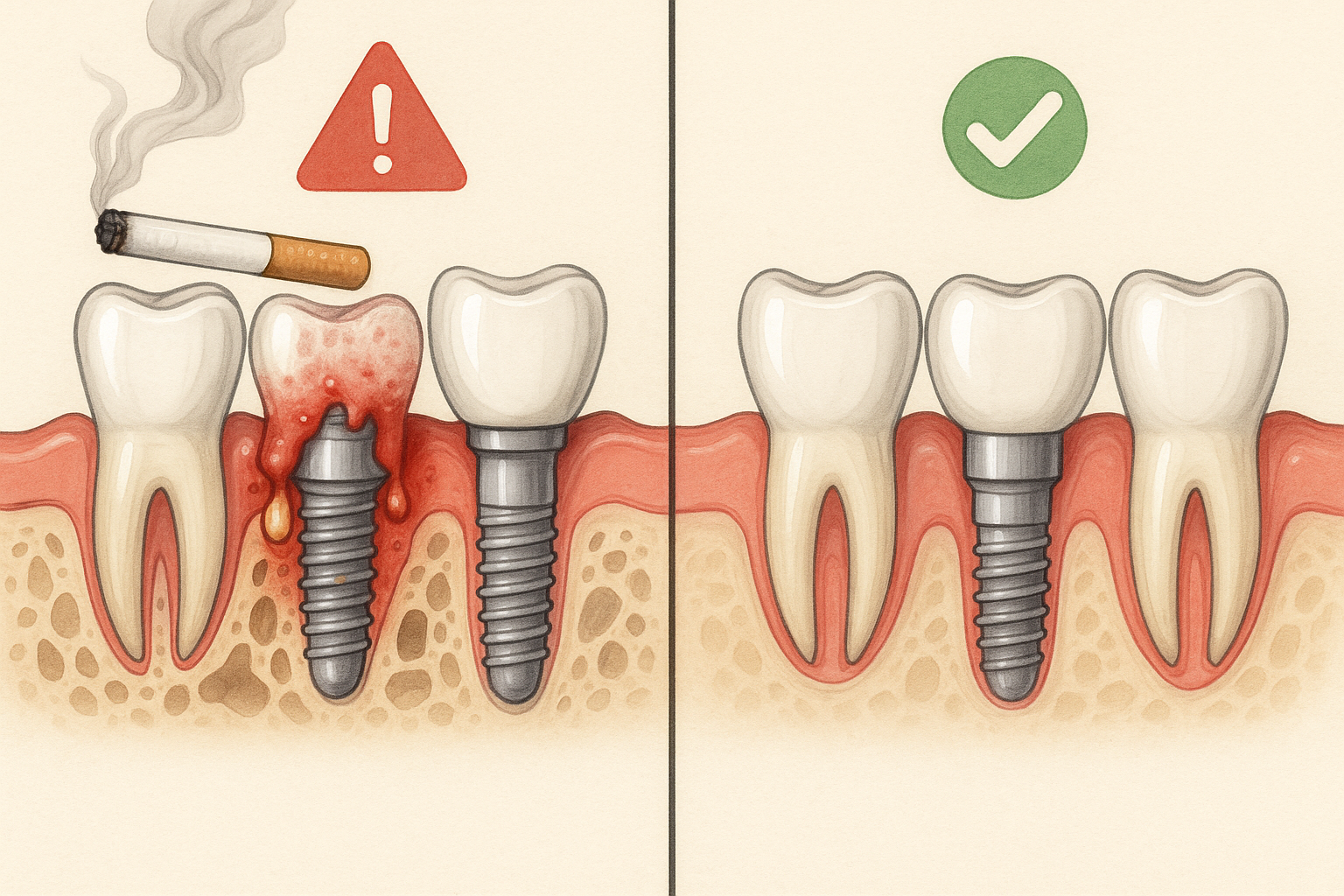
Your success depends on open communication with your dental team. Here’s how to get the support you need:
Be Honest About Your Habits
- Share your smoking history honestly
- Discuss your quit attempts and challenges
- Ask about additional support resources
- Don’t hide relapses—your team needs accurate information
Ask the Right Questions
- “What specific risks do I face as a smoker?”
- “How can I improve my chances of success?”
- “What warning signs should I watch for?”
- “Are there alternative treatments to consider?”
Follow Professional Guidance
Your dental team at our Dallas practice understands the unique challenges smokers face and can provide personalized strategies for success.
The Bottom Line: Your Smile Deserves Expert Care
Smoking after dental implants significantly increases your risk of complications, but it doesn’t make successful treatment impossible. The key is understanding the risks, making informed decisions, and getting the support you need to protect your investment.
Your journey to a better smile doesn’t have to be derailed by smoking. With the right approach, professional guidance, and commitment to your health, you can achieve the life-changing results that dental implants offer.
Remember, every cigarette you don’t smoke improves your chances of success. Whether you quit completely or significantly reduce your smoking, every positive change you make supports your healing and protects your investment in your smile.
Conclusion
The relationship between smoking and dental implant success is clear: smoking significantly increases the risk of complications and failure. However, this doesn’t mean you have to give up on your dream of a restored smile. By understanding the risks, exploring your options, and working closely with your dental team, you can make informed decisions that give you the best chance of success.
Whether you choose to quit smoking entirely, reduce significantly, or explore alternative treatment approaches, the most important step is taking action. Your smile deserves expert care, and with the right strategy, you can achieve the confident, functional smile you’ve been dreaming of.
Ready to take the next step? Schedule a consultation to discuss your specific situation and develop a personalized treatment plan that accounts for your smoking habits and maximizes your chances of success. Your journey to a better smile starts with understanding your options and making informed decisions about your oral health.

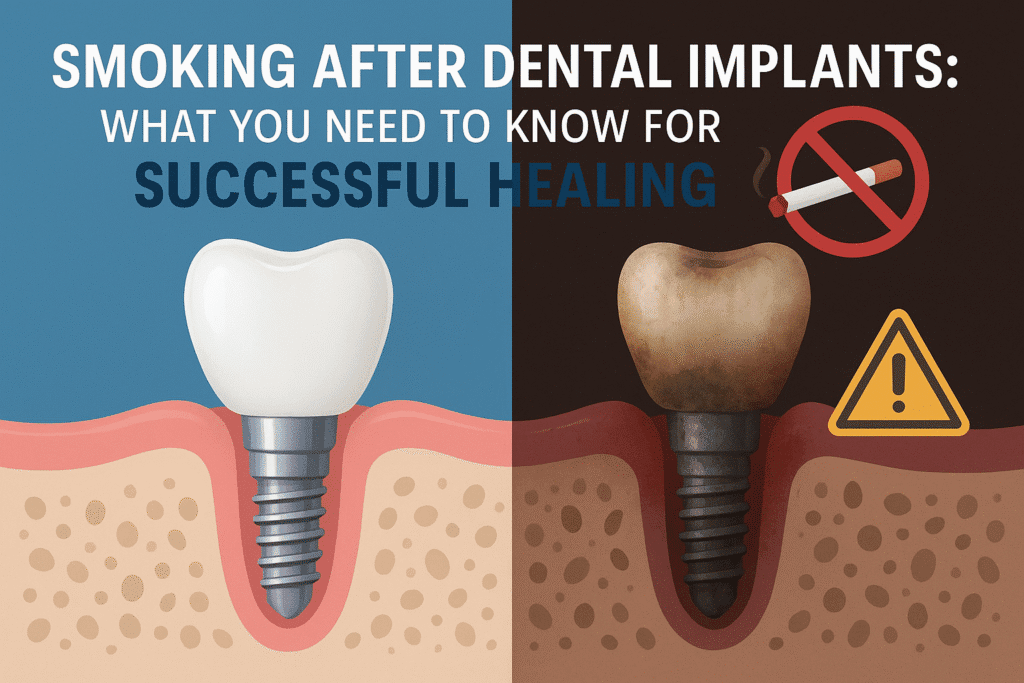
Leave a Reply
Share your thoughts or ask a question about dental implants. Your email address will not be published.